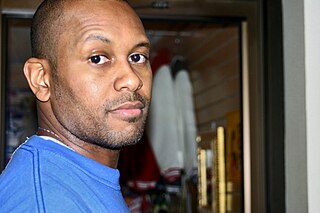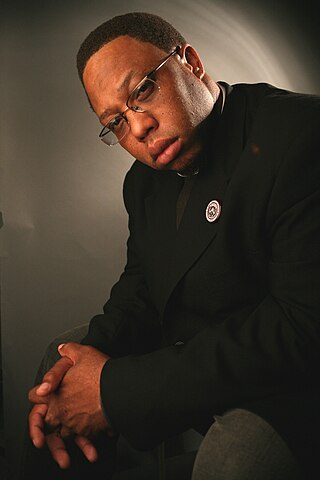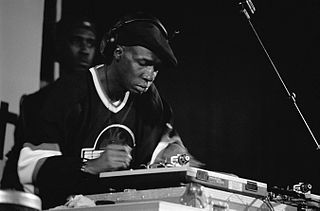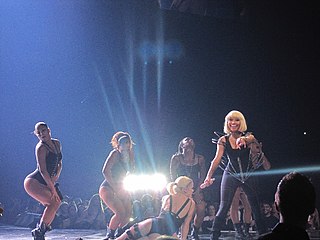Related Research Articles

Dana Elaine Owens, better known by her stage name Queen Latifah, is an American rapper, singer, and actress. She has received various accolades, including a Grammy Award, a Primetime Emmy Award, a Golden Globe Award, three Screen Actors Guild Awards, and two NAACP Image Awards, in addition to a nomination for an Academy Award. In 2006, she became the first hip hop artist to receive a star on the Hollywood Walk of Fame.
East Coast hip hop is a regional subgenre of hip hop music that originated in New York City during the 1970s. Hip hop is recognized to have originated and evolved first in The Bronx, New York City.
Southern hip hop, also known as Southern rap, South Coast hip hop, or dirty south, is a blanket term for a regional genre of American hip hop music that emerged in the Southern United States, especially in Georgia, Texas, Louisiana, Tennessee, and Florida—often titled “The Big 5,” five states which constitute the "Southern Network" in rap music.

Kevin Powell is an American writer, activist, and television personality. He is the author of 14 books, including The Education of Kevin Powell: A Boy's Journey into Manhood and When We Free the World published in 2020. Powell was a senior writer during the founding years of Vibe magazine from 1992 to 1996. Powell's activism has focused on ending poverty, advocating for social justice and counteracting violence against women and girls through local, national and international initiatives. He was a Democratic candidate for the United States House of Representatives in Brooklyn, New York, in 2008 and 2010.
Indian hip hop is a genre of popular music developed in India. Desi hip hop is a term given by Bohemia for music and culture which combines the influences of hip hop and the Indian subcontinent; the term desi referring to the South Asian diaspora. The term has also come to be used as an alternative for rap music and even pop music which involves rappers of South Asian origins.

Hip hop dance is a range of street dance styles primarily performed to hip hop music or that have evolved as part of hip hop culture. It is influenced by a wide range of styles that were created in the 1970s and made popular by dance crews in the United States. The television show Soul Train and the 1980s films Breakin', Beat Street, and Wild Style showcased these crews and dance styles in their early stages; therefore, giving hip-hop dance mainstream exposure.

Lennox Yearwood, Jr. is a minister and community activist. Yearwood currently serves as president of the Hip Hop Caucus, a national nonprofit, nonpartisan organization that empowers young people to participate in elections, policymaking and service projects. Yearwood has led or been involved in a number of high-profile campaigns to engage young voters, as well as working on human rights issues in the Gulf Coast region after Hurricane Katrina.

Breakdancing or breaking, also called b-boying or b-girling (women) is a style of street dance originated by African Americans with notable contributions from Puerto Ricans in the Bronx.

Hip hop or hip-hop is a culture and art movement that was created by African Americans, starting in the Bronx, New York City. Pioneered from Black American street culture, that had been around for years prior to its more mainstream discovery, it later reached other groups such as Latino Americans and Caribbean Americans. Hip-hop culture has historically been shaped and dominated by African American men, though female hip hop artists have contributed to the art form and culture as well. Hip hop culture is characterized by the key elements of rapping, DJing and turntablism, and breakdancing; other elements include graffiti, beatboxing, street entrepreneurship, hip hop language, and hip hop fashion. From hip hop culture emerged a new genre of popular music, hip hop music.

A video vixen is a woman who models and appears in hip hop-oriented music videos. From the 1990s to the early 2010s, the video vixen image was a staple in popular music, particularly within the genre of hip hop. The video vixen first came around in the late 1980s when the hip-hop culture began to emerge into its own lifestyle, although was most popular in American popular culture during the 1990s and 2000s. Many video vixens are aspiring actors, singers, dancers, or professional models. Artists and vixens have been criticized for allegedly contributing to the social degradation of black women and Latinas.

Clive Campbell, better known by his stage name DJ Kool Herc, is a Jamaican American DJ who is credited with being one of the founders of hip hop music in the Bronx, New York City, in 1973. Nicknamed the Father of Hip-Hop, Campbell began playing hard funk records of the sort typified by James Brown. Campbell began to isolate the instrumental portion of the record which emphasized the drum beat—the "break"—and switch from one break to another. Using the same two-turntable set-up of disco DJs, he used two copies of the same record to elongate the break. This breakbeat DJing, using funky drum solos, formed the basis of hip hop music. Campbell's announcements and exhortations to dancers helped lead to the syncopated, rhythmically spoken accompaniment now known as rapping.
Jacob Brian Dutton, known professionally as Jake One, is an American record producer and songwriter.
Hip hop or hip-hop, also known as rap and formerly as disco rap, is a genre of popular music that originated in the early 1970s from the African American community. Hip-hop music originated as an anti-drug and anti-violence genre consisting of stylized rhythmic music that often accompanies rapping, a rhythmic delivery of poetic speech. In the early 1990s, a professor of African American studies at Temple University said, "Hip-hop is something that blacks can unequivocally claim as their own." By the 21st century, the field of rappers had diversified by both race and gender. The music developed as part of the broader hip-hop culture, a subculture defined by four key stylistic elements: MCing/rapping, DJing/scratching with turntables, breakdancing, and graffiti art. While often used to refer solely to rapping and rap music, "hip hop" more properly denotes the practice of the entire subculture. The term hip hop music is sometimes used synonymously with the term rap music, though rapping is not a required component of hip hop music; the genre may also incorporate other elements of the culture, including DJing, turntablism, scratching, beatboxing, and instrumental tracks.
LGBT representations in hip hop music have existed since the birth of the genre even while enduring blatant discrimination. Due to its adjacency to disco, the earliest days of hip hop had a close relation to LGBT subcultures, and multiple LGBT DJs have played a role in popularizing hip hop. Despite this early involvement, hip hop has long been portrayed as one of the least LGBT-friendly genres of music, with a significant body of the genre containing homophobic views and anti-gay lyrics, with mainstream artists such as Eminem and Tyler, the Creator having used casual homophobia in their lyrics, including usages of the word faggot. Attitudes towards homosexuality in hip hop culture have historically been negative, with slang that uses homosexuality as a punchline such as "sus", "no homo", and "pause" being heard in hip hop lyrics from some of the industry's biggest artists. Since the early 2000s there has been a flourishing community of LGBTQ+ hip hop artists, activists, and performers breaking barriers in the mainstream music industry.

Love & Hip Hop is a media franchise that consists of several reality television series broadcast on VH1. The shows document the personal and professional lives of several hip hop and R&B musicians, performers, managers, and record producers residing in various metropolitan areas of the United States. The original installment premiered on March 6, 2011, and its success resulted in spin-offs based in Atlanta, Hollywood, and Miami.

Love & Hip Hop: New York is an American reality television series that premiered March 6, 2011 on VH1. The series chronicles the lives of several people in New York City, involved with hip hop music, and features appearances from notable figures associated with East Coast hip hop.
Misogynoir is a term referring to the combined force of anti-Black racism and misogyny directed towards black women. The term was coined by black feminist writer Moya Bailey in 2008 to address misogyny directed toward black transgender and cisgender women in American visual and popular culture. The concept of misogynoir is grounded in the theory of intersectionality, which analyzes how various social identities such as race, gender, class, age, ability, and sexual orientation interrelate in systems of oppression.
Mumble rap is a loosely defined microgenre of hip hop music that largely spread via the online audio distribution platform SoundCloud in the 2010s. The term implies mumbling, or unclear vocal delivery, by artists, and it has been used to describe rappers who do not share the rap genre's traditional emphasis on meaningful lyricism, choosing instead to emphasize other aspects of delivery like melody and tone.

Black veganism in the United States is a social and political philosophy that connects the use of non-human animals with other social justice concerns such as racism and with the lasting effects of slavery, such as the subsistence diets of enslaved people enduring as familial and cultural food traditions. Sisters Syl Ko and Aph Ko first proposed the intersectional framework for and coined the term Black veganism. The Institute for Critical Animal Studies called Black veganism an "emerging discipline".
Ratchet feminism emerged in the United States from hip hop culture in the early 2000s, largely as a critique of, and a response to, respectability politics. It is distinct from black feminism, womanism, and hip hop feminism. Ratchet feminism coopts the derogatory term (ratchet). Other terms used to describe this concept include ratchet womanism as used by Georgia Tech professor Joycelyn Wilson or ratchet radicalism used by Rutgers professor Brittney Cooper. Ratchet is an identity embraced by many millennials and Gen Z black women and girls. The idea of ratchetness as empowering, or of ratchet feminism, has been articulated by artists and celebrities like Nicki Minaj, City Girls, Amber Rose, and Junglepussy, scholars like Brittney Cooper and Mikki Kendall, and through events like Amber Rose's SlutWalk. Many view ratchet feminism as a form of female empowerment that doesn't adhere to respectability politics.
References
- ↑ Foo Yee Ping. "Black man blogs to back Republicans". The Star , 10/28/2008.
- ↑ John Eligon. "Young, Black and Republican in New York, Blogging Against the Tide". New York Times , 10/8/2008.
- ↑ Sewell Chan. "As Lauder Folds, Term Limits Battle Rages". New York Times , 10/9/2008.
- ↑ Frank Lewis. "GOP STILL BAFFLED BY THE INTERNETS, RACE". Cleveland Scene , 7/8/2009
- ↑ Emily Ramshaw. "Hip Hop Republicans". The Dallas Morning News , 9/2/2008.